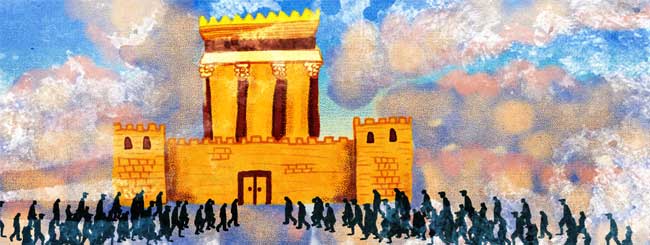 Rabbi David Etengoff Dedicated to the sacred memories of my mother, Miriam Tovah bat Aharon Hakohen, father-in-law, Levi ben Yitzhak, sister, Shulamit bat Menachem, sister-in-law, Ruchama Rivka Sondra bat Yechiel, Chana bat Shmuel, Yehonatan Binyamin ben Mordechai Meir Halevi, Shoshana Elka bat Avraham, Tikvah bat Rivka Perel, Peretz ben Chaim, Chaya Sarah bat Reb Yechezkel Shraga, Shmuel Yosef ben Reuven, Shayndel bat Mordechai Yehudah, the Kedoshim of Har Nof, Pittsburgh, and Jersey City, and the refuah shlaimah of Mordechai HaLevi ben Miriam Tovah, Yocheved Dafneh bat Dinah Zehavah, and the health and safety of our brothers and sisters in Israel and around the world. Many Torah-observant Jews are deeply conflicted regarding the reinstitution of korbanot. Although they viewt the binding character of these mitzvot with the same respect they have for other commandments, their alienation from this form of service to Hashem engenders a disconnect between what He has commanded and their personal beliefs. In my estimation, this is based on a fundamental lack of understanding of the inherent meaning and purpose of the korbanot. As such, we are fortunate that in his Commentary on the Torah on Sefer Vayikra 1:2, Rabbi Shimshon Raphael Hirsch zatzal (1808-1888) offers a trenchant analysis of this subject that is as relevant today as it was in the late 19th century. Rav Hirsch begins his discussion of the word “korban” by suggesting, “We have no word that really represents the idea which lies in the expression korban.” He notes that defining korban as “sacrifice” fails to convey its true meaning. In addition, since it “…implies the idea of giving something up that is of value to oneself for the benefit of another, or of having to do without something of value…” it is actually diametrically opposed to the essence of a korban. Even the term, “offering,” fails to communicate what the Torah means by korban: In addition, the underlying idea of “offering” makes it by no means an adequate expression for korban. The idea of an offering presupposes a wish, a desire, a requirement for what is brought, on the part of the one to whom it is brought, which is satisfied by the ‘offering’. One cannot get away from the idea of gift, a present. But the idea of a korban is far away from all this. If a korban is neither a sacrifice nor an offering, how is it to be defined? Rav Hirsch suggests the following: It is never used for a present or gift, it is used exclusively with reference to man’s relation to G-d and can only be understood from the meaning which lies in the root krv. Krv means to approach, to come near, and so to get into close relationship with someone. This at once most positively gives the idea of the object and purpose of hakravah (drawing close) as the attainment of a higher sphere of life. This concept of korban as the vehicle whereby one obtains “the attainment of a higher sphere of life” is the essence of Rav Hirsch’s explication of our term. Approaching Hashem in a true I-Thou relationship through a korban, therefore, “…rejects the idea of a sacrifice, of giving something up, of losing something, as well as being a requirement of the One to Whom one gets near…” Instead, the makrivim (the ones who bring the korban) have an overwhelming desire to draw near to their Creator and, therefore, desire something representative of themselves to “come into a closer relationship to G-d…” From this perspective, the korbanot emerge as a symbolic fulfillment of the well-known second verse of the Shema: “And you shall love the L-rd, your G-d, with all your heart and with all your soul, and with all your means.” As such, the purpose of a korban is to enable “kirvat Elokim, nearness to Hashem,” that will lead to “the attainment of a higher sphere of life.” This idea is given powerful voice by Dovid HaMelech when he declares, “kirvat Elokim li tov” (“Closeness to G-d is what is truly good for me,” Sefer Tehillim 73:28). With Hashem’s help and our fervent desire, may we be zocheh (merit) to draw ever nearer to Him, and may we encounter His Divine Presence in the third Beit HaMikdash soon, and in our days. V’chane yihi ratzon. Shabbat Shalom Past drashot may be found at my blog-website: http://reparashathashavuah.org. Please contact me at [email protected] to be added to my weekly email list. *** My audio shiurim on the topics of Tefilah and Tanach may be found at: http://tinyurl.com/8hsdpyd *** I have posted 164 of Rabbi Soloveitchik’s English language audio shiurim (MP3 format) spanning the years 1958-1984. Please click on the highlighted link: The Rav
0 Comments
Leave a Reply. |
Details
Archives
July 2024
AuthorTalmid of Rabbi Soloveitchik zatzal Categories |
- Blog: Rabbi David Etengoff: Parashat HaShavuah
- Sefer Bereishit 5784&5785
- Sefer Shemot 5784&5785
- Sefer Vayikra 5784&5785
- Sefer Bamidbar 5784 &5785
- Sefer Bereishit 5782&5783
- Sefer Shemot 5782&5783
- Sefer Vayikra 5782&5783
- Sefer Bamidbar 5782&5783
- Sefer Devarim 5782&5783
- Sefer Bereishit 5780& 5781
- Sefer Shemot 5780&5781
- Sefer Vayikra 5780&5781
- Sefer Bamidbar 578&5781
- Sefer Devarim 578&5781
- Sefer Bereishit 5778&5779
- Sefer Shemot 5778&5779
- Sefer Vayikra 5778&5779
- Sefer Bamidbar 5778&5779
- Sefer Devarim 5778&5779
- Sefer Bereishit 5776&5777
- Sefer Bereishit 5774&5775
- Sefer Bereishit 5772&5773
- Sefer Bereishit 5771&5770
- Sefer Shemot 5776&5777
- Sefer Shemot 5774&5775
- Sefer Shemot 5772&5773
- Sefer Shemot 5771&5770
- Sefer Vayikra 5776&5777
- Sefer Vayikra 5774&5775
- Sefer Vayikra 5772&5773
- Sefer Vayikra 5771&5770
- Sefer Bamidbar 5776&5777
- Sefer Bamidbar 5774&5775
- Sefer Bamidbar 5772&5773
- Sefer Bamidbar 5771&5770
- Sefer Devarim 5776&5777
- Sefer Devarim 5774&5775
- Sefer Devarim 5772&5773
- Sefer Devarim 5771&5770
 RSS Feed
RSS Feed
